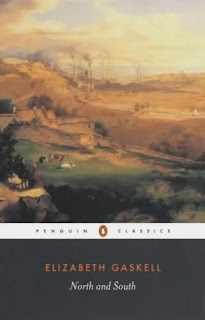When we hear "North and South" we are inclined to think "Canadians vs. Americans" or "Northern USA vs Southern USA"... but Elizabeth Gaskell's North and South refers to the industrial North of England vs the pastoral South of England.
Gaskell is a contemporary of Dickens, Wordsworth and Charlotte Bronte and originally published this book in installments like Dickens did with many of his novels. However, she was unsatisfied with this format and later had her book published in its entirety, after some revisions and additions. Her book moves as a slow, chatty Dickens-like pace, and exposes the corruption in the industrial system in a more sympathetic manner. Margaret is a delicate country girl, who moves with her parents to the industrial town of Milton, where she is challenged by, and ultimately comes to love John Thorton, an ambitious mill owner. What is remarkable about Elizabeth Gaskell's take on these issues, is not Margaret's sympathy for the striking mill workers, but the very human portrayal of John, the mill-owner and the influence that he and Margaret have on each other.
Although revolutionary in it's thought at the time, the underlying concept of those times ("the evil of a world of machines that destroy our humanity") seems so absurd to us today, as we co-exist peacefully with so much mechanization and computerization (is that even a word??).
Does that make a novel like Elizabeth Gaskell's "North and South" irrelevant to readers today?


viagra jakarta
ReplyDeleteviagra asli jakarta
obat kuat jakarta
pil biru jakarta